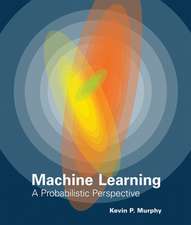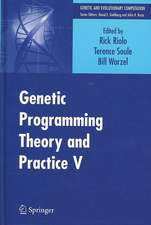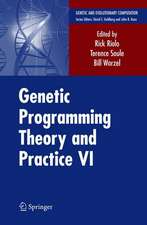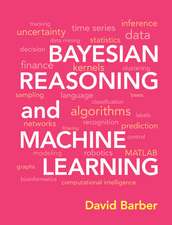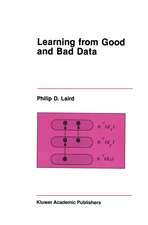Genetic Programming Theory and Practice IV: Genetic and Evolutionary Computation
Editat de Rick Riolo, Terence Soule, Bill Worzelen Limba Engleză Hardback – 14 mar 2007
This volume represents a watershed moment in the GP field in that GP has begun to move from hand-crafted software used primarily in academic research, to an engineering methodology applied to commercial applications. It is a unique and indispensable tool for academics, researchers and industry professionals involved in GP, evolutionary computation, machine learning and artificial intelligence.
| Toate formatele și edițiile | Preț | Express |
|---|---|---|
| Paperback (1) | 989.96 lei 6-8 săpt. | |
| Springer Us – 19 noi 2010 | 989.96 lei 6-8 săpt. | |
| Hardback (1) | 996.40 lei 6-8 săpt. | |
| Springer Us – 14 mar 2007 | 996.40 lei 6-8 săpt. |
Din seria Genetic and Evolutionary Computation
- 20%
 Preț: 934.69 lei
Preț: 934.69 lei - 20%
 Preț: 590.21 lei
Preț: 590.21 lei - 20%
 Preț: 997.25 lei
Preț: 997.25 lei - 20%
 Preț: 651.42 lei
Preț: 651.42 lei - 20%
 Preț: 614.43 lei
Preț: 614.43 lei - 20%
 Preț: 650.08 lei
Preț: 650.08 lei - 20%
 Preț: 332.24 lei
Preț: 332.24 lei - 20%
 Preț: 649.09 lei
Preț: 649.09 lei - 20%
 Preț: 995.09 lei
Preț: 995.09 lei - 20%
 Preț: 643.17 lei
Preț: 643.17 lei - 20%
 Preț: 331.08 lei
Preț: 331.08 lei - 20%
 Preț: 340.32 lei
Preț: 340.32 lei - 20%
 Preț: 333.72 lei
Preț: 333.72 lei - 20%
 Preț: 651.23 lei
Preț: 651.23 lei - 20%
 Preț: 336.02 lei
Preț: 336.02 lei - 20%
 Preț: 1050.86 lei
Preț: 1050.86 lei - 20%
 Preț: 1458.70 lei
Preț: 1458.70 lei - 20%
 Preț: 983.71 lei
Preț: 983.71 lei - 20%
 Preț: 992.44 lei
Preț: 992.44 lei - 20%
 Preț: 1048.53 lei
Preț: 1048.53 lei - 20%
 Preț: 1473.24 lei
Preț: 1473.24 lei - 20%
 Preț: 939.31 lei
Preț: 939.31 lei - 20%
 Preț: 593.54 lei
Preț: 593.54 lei
Preț: 996.40 lei
Preț vechi: 1245.50 lei
-20% Nou
Puncte Express: 1495
Preț estimativ în valută:
190.68€ • 207.05$ • 160.17£
190.68€ • 207.05$ • 160.17£
Carte tipărită la comandă
Livrare economică 22 aprilie-06 mai
Preluare comenzi: 021 569.72.76
Specificații
ISBN-13: 9780387333755
ISBN-10: 0387333754
Pagini: 338
Ilustrații: XVI, 338 p. 200 illus.
Dimensiuni: 155 x 235 x 32 mm
Greutate: 0.68 kg
Ediția:2007
Editura: Springer Us
Colecția Springer
Seria Genetic and Evolutionary Computation
Locul publicării:New York, NY, United States
ISBN-10: 0387333754
Pagini: 338
Ilustrații: XVI, 338 p. 200 illus.
Dimensiuni: 155 x 235 x 32 mm
Greutate: 0.68 kg
Ediția:2007
Editura: Springer Us
Colecția Springer
Seria Genetic and Evolutionary Computation
Locul publicării:New York, NY, United States
Public țintă
ResearchCuprins
Genetic Programming: Theory and Practice.- Genome-Wide Genetic Analysis Using Genetic Programming: The Critical Need for Expert Knowledge.- Lifting the Curse of Dimensionality.- Genetic Programming for Classifying Cancer Data and Controlling Humanoid Robots.- Boosting Improves Stability and Accuracy of Genetic Programming in Biological Sequence Classification.- Orthogonal Evolution of Teams: A Class of Algorithms for Evolving Teams with Inversely Correlated Errors.- Multidimensional Tags, Cooperative Populations, and Genetic Programming.- Coevolving Fitness Models for Accelerating Evolution and Reducing Evaluations.- Multi-Domain Observations Concerning the Use of Genetic Programming to Automatically Synthesize Human-Competitive Designs for Analog Circuits, Optical Lens Systems, Controllers, Antennas, Mechanical Systems, and Quantum Computing Circuits.- Robust Pareto Front Genetic Programming Parameter Selection Based on Design of Experiments and Industrial Data.- Pursuing the Pareto Paradigm: Tournaments, Algorithm Variations and Ordinal Optimization.- Applying Genetic Programming to Reservoir History Matching Problem.- Comparison of Robustness of Three Filter Design Strategies Using Genetic Programming and Bond Graphs.- Design of Posynomial Models for Mosfets: Symbolic Regression Using Genetic Algorithms.- Phase Transitions in Genetic Programming Search.- Efficient Markov Chain Model of Machine Code Program Execution and Halting.- A Re-Examination of a Real World Blood Flow Modeling Problem Using Context-Aware Crossover.- Large-Scale, Time-Constrained Symbolic Regression.- Stock Selection: An Innovative Application of Genetic Programming Methodology.
Recenzii
From the reviews:
"Every cutting-edge researcher, in every computational discipline, working on any real-world application, should make it a point to keep abreast of the ongoing progress of genetic programming theory and practice, which is currently available in this book. … a great win-win synergy opportunity here for less-cutting-edge researchers to try these maturing tools on more intuitive data masses; they should be more able to appreciate the results, and the genetic programming cryptography community might then learn something new about how to interpret post-scientific results." (Chaim Scheff, ACM Computing Reviews, Vol. 49 (8), August, 2008)
"Every cutting-edge researcher, in every computational discipline, working on any real-world application, should make it a point to keep abreast of the ongoing progress of genetic programming theory and practice, which is currently available in this book. … a great win-win synergy opportunity here for less-cutting-edge researchers to try these maturing tools on more intuitive data masses; they should be more able to appreciate the results, and the genetic programming cryptography community might then learn something new about how to interpret post-scientific results." (Chaim Scheff, ACM Computing Reviews, Vol. 49 (8), August, 2008)
Textul de pe ultima copertă
Genetic Programming Theory and Practice IV was developed from the fourth workshop at the University of Michigan’s Center for the Study of Complex Systems to facilitate the exchange of ideas and information related to the rapidly advancing field of Genetic Programming (GP). Contributions from the foremost international researchers and practitioners in the GP arena examine the similarities and differences between theoretical and empirical results on real-world problems. The text explores the synergy between theory and practice, producing a comprehensive view of the state of the art in GP application.
This valuable reference discusses the hurdles faced in solving large-scale, cutting edge applications, describes promising techniques, including fitness approximation, Pareto optimization, cooperative teams, solution caching, and experiment control, and investigates evolutionary approaches such as financial modeling, bioinformatics, symbolic regression for system modeling, and evolutionary design of circuits and robot controllers.
Genetic Programming Theory and Practice IV represents a watershed moment in the GP field in that GP has begun to move from hand-crafted software used primarily in academic research, to an engineering methodology applied to commercial applications. It is a unique and indispensable tool for academics, researchers and industry professionals involved in GP, evolutionary computation, machine learning and artificial intelligence.
This valuable reference discusses the hurdles faced in solving large-scale, cutting edge applications, describes promising techniques, including fitness approximation, Pareto optimization, cooperative teams, solution caching, and experiment control, and investigates evolutionary approaches such as financial modeling, bioinformatics, symbolic regression for system modeling, and evolutionary design of circuits and robot controllers.
Genetic Programming Theory and Practice IV represents a watershed moment in the GP field in that GP has begun to move from hand-crafted software used primarily in academic research, to an engineering methodology applied to commercial applications. It is a unique and indispensable tool for academics, researchers and industry professionals involved in GP, evolutionary computation, machine learning and artificial intelligence.
Caracteristici
Discusses the hurdles faced in solving large-scale, cutting edge applications Describes promising techniques, including fitness approximation, Pareto optimization, cooperative teams, solution caching, and experiment control Explores evolutionary approaches such as financial modeling, bioinformatics, symbolic regression for system modeling, and evolutionary design of circuits and robot controllers Includes supplementary material: sn.pub/extras


